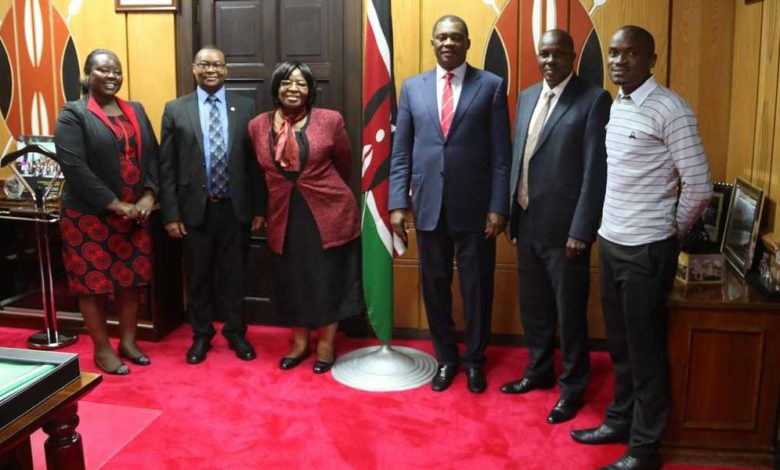Access to Information Laws not obeyed by Parliament and Auditor General

Parliament and the County assemblies are required under Section 39 of the Public Audit Act to make public within seven days all Auditor General’s Reports after they are tabled in national and county assemblies respectively. The Auditor General (OAG) has to comply with part 2 and 3 of section 39 of Public Audit Act by publishing his reports on their official website and other public spaces not later than 14 days after the reports are submitted to the Parliament. While OAG have on their website uploaded 46 of 47 County assembly audited reports for financial year 2016/2017, the reports on constituencies (National Constituencies Development Funds) for the same financial year period are unavailable. But parliament, County assemblies and other constitutional bodies are adamant and noncompliance about Auditor-General’s reports as required by access to information laws.
Examples of missing Auditor General Reports
On August 28 and 29 2018,, key audits reports were tabled in Parliament according to two Hansard reports (Tuesday and Wednesday). Those of independent constitutional bodies like IPOA, parastatals and at least 18 constituencies for the year that ended 30th June 2017” were tabled respectively.
List of NG-CDF reports tabled
These were the constituencies whose reports were tabled in Parliament, at least according to the Hansard report:
- Ainabkoi
- Marakwet West
- Keiyo South
- Marakwet East
- Endebess
- Msambweni
- Matuga
- Rabai;
- Turkana East;
- Turkana West;
- Kajiado West;
- Kajiado North;
- Yatta;
- Kangundo;
- Aldai;
- Tinderet
- Chesumei; and
- Kinango
List of other OAG Reports in Parliament
Other reports tabled in the House included annual report and financial statements of the Independent Policing Oversight Authority (IPOA); Kenya Ordinance Factories Corporation; Kerio Valley Development Authority; Unclaimed Assets Trust Fund; Garissa University; Constituencies Development Fund Board; Kenya Revenue Authority for the year that ended 30th June 2017. Financial statements of Kenya National Trading Company Corporation Limited for the year that ended 30th June 2016 were also tabled according to the Hansard reports.
Laws not followed
However, according to our research, these audit reports except are unavailable right from the Auditors General own website all the way to both national and county government websites as of today. Advanced google search as well as physical inquiry from these key institutions do not yield anything. Unfortunately this makes it impossible to verify what papers were tabled on August 28 and 29 in Parliament as the “papers laid” section on National Assembly’s website is empty – only a handful of old papers from the 11th parliament can be accessed on the website. The 12th Parliament seems has done very little to make “papers laid” on the table of the House available for public perusal.
No Response from The OAG Office to our Request
A search for the auditor general reports that were tabled in the National assembly on these particular dates shows: They remain unavailable online. The AOG office had not responded to a request made for these reports by the time of publishing this article.
The vital Importance of Access to Information
Lack of access to information held by government not only denies journalists the opportunity to inform the public but also robs citizens of the power to an accurate critique of development projects, budgetary allocations and how expenditures have been were rolled out.
Access to timely and comprehensive information is critical for meaningful participation in government decision making by citizens. Unfortunately accessing public records such as financial budgetary allocations or audited reports on expenditure both at the national and county units in Kenya is still a challenge despite having in place Access to Information Act passed in August 2016 and came to force a year later in September 2017. Without accessing these vital information in government institutions it is hard for journalists to penetrate bureaucracies that repulse all forms of inquiry.
What the Law wants them to do
Access to Information Act asserts the fact that access to information is the right of every citizen and that the government is only a custodian of that information. The Act prescribes that any public or private institution that withholds information requested by a private citizen or any Kenyan for that matter will face criminal charges.
You can read more here on the general rules and procedures about access to information.
By Robert Wanjala Kituyi
Results of Google advanced Searches
… on the example of the Ainabkoi Constituency CDF audit report, which is the first in the alphabet on the list:
Question 1 : Where are the terms “Anabkoi” and “auditor general report” mentioned in a page or file not older than one year on the parliament website?
Advanced google search results for the first question (real time)
Question 2: Are the 2016/17 Auditor General Reports on the NG-CDFs on his website?
Check on the Auditor Generals download page of CDF audit reports to see if a new 2016/2017 directory has been created or not and if the file you are searching for is in it:
http://www.oagkenya.go.ke/index.php/reports/cat_view/2-reports/136-cdf
Question 3: Has your NG CDF published their budget documents?
Aianabkoi has not. According to Access to Information Act, they are required to. But this is just an example:
https://www.ngcdf.go.ke/index.php/component/constituencies/allocations/144
Search for you own NG-CDF’s documents here: https://www.ngcdf.go.ke/index.php/component/constituencies